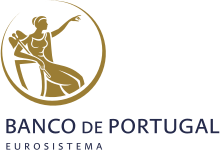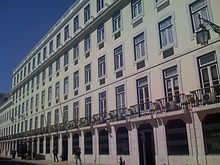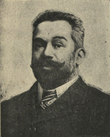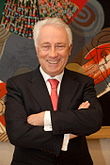
Sporting Clube de Portugal, otherwise referred to as Sporting CP or simply Sporting, or as Sporting Lisbon in other countries, is a Portuguese sports club based in Lisbon. Having various sports departments and sporting disciplines, it is best known for its men's professional football team playing in the Primeira Liga, the top flight of Portuguese football.

José Manuel Rodrigues "Joe" BerardoGCIH, ComIH, is a Portuguese and South African businessman, investor, and art collector. According to Portuguese magazine Exame, he had an estimated net worth of €598 million in 2010, making him one of the wealthiest people in Portugal at the time. Starting around the 2010–2014 Portuguese financial crisis when both the Portuguese Republic finances and banking system collapsed, he has been involved in several controversies and legal issues which have led to the arrestment of his bank accounts, his companies' assets and himself due to ongoing legal investigations.
Banco Montepio, formerly Montepio Geral, legally incorporated as Caixa Económica Montepio Geral, Caixa Económica Bancária, S.A. is a Portuguese mutual savings organization, better known for its banking activity. Banco Montepio was established in 1844 and is headquartered in Lisbon.
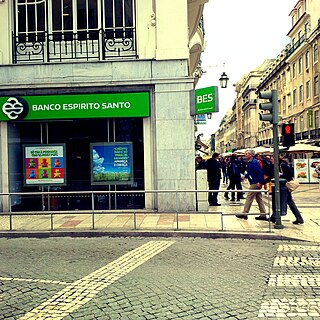
Banco Espírito Santo (BES) was a Portuguese bank based in Lisbon that on 3 August 2014 was split in two banks: Novo Banco, which kept its healthy operations, and a "bad bank" to keep its toxic assets.

The National Bank of Angola is the central bank of Angola. It is state-owned and the Government of Angola is the sole shareholder. The bank is based in Luanda, and was created in 1926, but traces its ancestry back to 1865. The National Bank of Angola is active in developing financial inclusion policy and is a member of the Alliance for Financial Inclusion.

Banco Comercial Português is a Portuguese bank that was founded in 1985 and is the largest private bank in the country. BCP is a member of the Euronext 100 stock index and its current chief executive officer is Miguel Maya Dias Pinheiro. BCP is based in Porto, but its operations are headquartered in Oeiras, Greater Lisbon. It operates a branch brand-dubbed and restyled in 2004 as Millennium BCP as well as Banque BCP and ActivoBank.
The Espírito Santo Financial Group (ESFG) was a Portuguese holding company with headquarters in Luxembourg, founded in 1984. The group represents the interests of the Portuguese Espirito Santo Group, which has major investments in Portugal and Europe, Americas, Africa and Asia.
Banco Português de Negócios, or simply BPN, was a Portuguese banking institution. It used to be a private bank, but was nationalized by the Portuguese Government in 2008 after a bad management and malpractice-related debt of 1.800 billion euros and several irregularities uncovered in the institution. In 2012, BPN, stripped of many of its debts and bad loans, was sold to Angola’s Banco BIC for €40 million.

Manuel António Gomes de Almeida de Pinho is a former Portuguese Minister of Economy and Innovation (2005–09) in the José Sócrates cabinet, who subsequently became an energy policy academic (2010–17) under circumstances that led to indictments in Portugal in 2017 and 2019, to house arrest since 2021, and to multiple charges of passive corruption, tax fraud, and money laundering in 2022. According to those charges, Pinho received, while in office, at least 4.5 million euros in secret monthly offshore payments from his prior and subsequent boss Ricardo Espírito Santo Salgado whose Espírito Santo Financial Group benefited from several of Pinho's decisions as minister.
Carlos Cecílio Nunes Góis Mota was the 29th Portuguese president of Sporting CP between 28 January 1953 and 31 January 1957.

The Companhia União Fabril (CUF) was one of the largest and oldest Portuguese conglomerates from the 1930s to 1974 and later a chemical corporation which was by then a part of Grupo José de Mello founded in 1988. After many acquisitions, mergers and divestitures, from the late 1970s to the 2010s, the company known as CUF and its brand was gradually restructured and morphed into a brand-new hospital in Lisbon. Now the brand cuf, whose major shareholders and founders are heirs of the old CUF conglomerate, is tied to one of the major healthcare providers of Portugal known as cuf saúde with several hospitals and clinics across the country and formerly known as José de Melo Saúde, a healthcare provider which is a division of Grupo José de Mello. The chemical industry businesses were consolidated in 2018 into a new brand and company called Bondalti which was established within the Grupo José de Mello.

Álvaro de Oliveira Madaleno Sobrinho is a Portuguese Angolan banker and businessman that developed his career in Portugal. He rose to prominence as director of Portuguese bank Banco Espírito Santo that went bankrupt in 2014.

Ricardo Espírito Santo Silva Salgado is a Portuguese economist and convicted banker. Former president of Banco Espírito Santo, which was founded by his grandfather, he was, until July 2014, the banker active for the longest time in Portugal.
Vítor Augusto Brinquete Bento is a Portuguese banker. He was the CEO of the Portuguese bank Novo Banco since August 4, 2014 until September 13, 2014, when he announced his resignation. He was replaced by Eduardo Stock da Cunha.
Novobanco, Novo Banco, SA, is a major Portuguese financial bank headquartered in Lisbon, Portugal. Following the entry into force of European Banking Supervision in late 2014, Novo has been designated as a Significant Institution and is supervised by the European Central Bank.
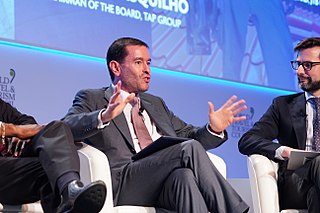
Miguel Reis Antunes Frasquilho is a Portuguese economist, politician, and executive, currently serving as Chairman of the Board of TAP Air Portugal, Portugal's flag carrier airline. He also serves on the Olympic Committee of Portugal.

Quinta da Beloura is an affluent gated community and golf resort located in Linhó, Sintra, on the Portuguese Riviera. The community is known for hosting numerous golf tournaments, tennis opens, and equestrian & dressage events, as well as for being the home of numerous famous personalities.
Almerindo da Silva Marques was a Portuguese businessman and politician.

ebankIT is an international company that develops digital banking platforms.
